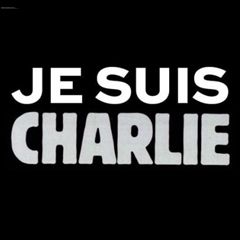Below are some links to news, commentary and reactions to the Charlie Hebdo shootings, but to start off, here's a fascinating look at the staff at work, planning their first Prophet Muhammad cartoon issue. This five-minute video not only shows the slain cartoonists at work, it provides valuable context for everything that follows. [The New York Times]
Demonstrations | The crowd at Sunday's rally in honor of the slain Charlie Hebdo cartoonists was estimated at 1.6 million, and leaders of more than 40 nations were there as well. [The New York Times]
Publishing | Isabel Hanne has an eyewitness report on Friday's editorial meeting of the remaining Charlie Hebdo staff, in which they discuss both the upcoming issue and their colleagues' funerals. (In French.) [Libération]
Creators | The cartoonist Luz, who's on staff at Charlie Hebdo but was late to the fateful meeting, says the cartoons have taken on a significance they were never intended to have: "In the end, the symbolic weight is exactly what Charlie has always worked against: destroying symbols, breaking down taboos, bursting bubbles of fantasy. It’s wonderful that people are giving us their support but it’s going against Charlie’s cartoons." [Les Inrockuptables]
Creators | Willem, another Charlie Hebdo cartoonist and the president of last year's Angouleme festival, is bitter: "We vomit on all these people who suddenly say they are our friends." [Yahoo News]
Background | Olivier Tonneau writes a long but very informative post on the history of Muslims, Arabs and North Africans in France, as well as the place of Charlie Hebdo in the French political scene, all from the perspective of someone who shares the magazine's radical-left politics. [Mediapart]
Background | Scholar and critic Jeet Heer writes about the tradition of French satire and Charlie Hebdo's place in it. [The Globe and Mail]
Background | In a paper published in 2009, Jane Weston delves into the history of Charlie Hebdo and puts it into context in terms of French comics and that country's long history of satire. Following the paper is an interview with the cartoonist Cabu, who was killed in the attacks last Wednesday. (Hat tip to scholar Aaron Kashtan, who asked the publisher to remove the paywall.) [European Comic Art]
Commentary | Chad Parkhill looks at the politics behind the Charlie Hebdo cartoons and explains a few of the more puzzling ones, cautioning that most of us outside France are missing a lot of context. [Junkee]
Commentary | Asgar Bukhari of the Muslim Public Affairs Committee UK argues that this is all about war, not free speech. (Warning: Offensive images.) [Medium]
Commentary | Jonathan Freedland pushes back on the notion that periodicals should publish the Prophet Muhammad cartoonist just to show that they can. [The Guardian]
Political cartoons | The Malaysian cartoonist Zunar has called for Jan. 7 to be World Cartoonists Day to honor the slain Charlie Hebdo cartoonists. He added, "as a Muslim myself, I would like to challenge the Muslim authorities around the world to work closer with cartoonists to produce cartoons that can show the true image of Islam: a religion of peace, tolerance and moderation." [Comic Riffs]
Political cartoons | Pinar Tremblay writes about the responses to the Charlie Hebdo attacks in Turkey, where some cartoonists have also been threatened. [Al-Monitor]
Comics | Ruben Bolling responds to Joe Sacco's comic about the murders, cautioning that it's difficult to understand the satire of another culture. [Tom the Dancing Bug]
Creators | Satirist Karl Sharro, who often takes the Middle East as his subject, discusses the modern tendency toward self-censorship. [The Atlantic]
Creators | Robert Crumb, who lives in France and drew a cartoon about the Prophet Muhammad for the newspaper Libération, gives his take on Charlie Hebdo, which he compares to the underground comics of the 1970s. [New York Observer]
Religion | Fareed Zakaria writes about the history of blasphemy and the political uses of accusations of blasphemy, and he points out that the only sacred book that proscribes blasphemy is the Christian Bible. [Fareed Zakaria]
Religion | The website On Islam rounded up comments from a number of Muslim scholars denouncing the killings and pointing out neither the Koran nor Islamic tradition prescribes the death penalty, or indeed any harsh punishment, for blasphemy. [On Islam]
Comics | Here's a roundup of cartoons responding to the shootings from Arab newspapers. [Mic.com]




